The Psychology of the Traveler
To speakers of English, the notion of travel ties in with labor, French travailler. But the French associate travel with being on the road, voyager, derived originally from Latin via or road. For the Germans, reisen implies the pirate’s brand of roving. Very early on the prototypical tourist Odysseus took the ultimate voyage, climbing, falling, sailing, violating local protocol, other times honoring it exquisitely, risking his life with huge gusto even as he admitted fear… remember the beautiful passage in Book 5 (l. 271), when travail subsides and calm voyaging replaces it: “neither did sleep weigh down his eyelids as he contemplated … [various constellations are named] .…” Seventeen days his voyage between Aiaia and Phaecia assumed this halcyon plateau before one of the most famous wild storms in literature, an “epic” description as paragon of the genre as the “Summer” segment of Vivaldi’s Four Seasons. “Neither could his eyes close as he gazed in wonder around him.” How often these words occur to me, a reminder never to close my eyes when in new terrains, never to settle into the routine when I have 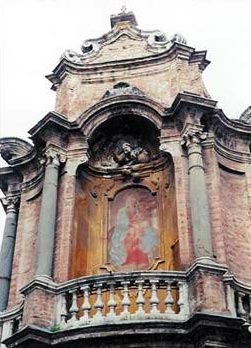 removed myself from it, en voyage …
removed myself from it, en voyage …
- Being gone, the distance ravels round and arms,
- What may be, is…
I wrote many years ago in Greece, a summer of self-styled odyssey-ing and self-conscious imitation of Ezra Pound’s educated wandering around Europe; note the affection of a dangling participle, symptomatic of my extreme but self-conscious and purposefully displaced stupor and disorientation. Sitting there in Syntagma Square (Athens’s answer to Time Square, especially on New Year’s Eve) that day in 1975, baking in the midsummer heat when all sensible people were at home taking siestas (an art form I eschewed the entire summer according to the “keep your eyes open when you’re en voyage” principle), I realized that I could tell anyone back home absolutely anything I wanted to and they’d have no way on earth to verify it. As a matter of fact, little fabrication turned out to be necessary, but the black hole of possibility opened up to me that day; moreover: anything that occurred there, even purchasing a loaf of packaged bread (an act of sacrilege where there are so many wonderful bakeries) takes on exotic overtones. From this mellow perspective, I think of the time I realized that no church could turn me away, nor synagogue, and exploited that possibility to the fullest. I always justify this sort of “travel” as a writer, an identity that has opened all sorts of windows for me. We are confined by so many useless preconceptions that so limit our perspectives. Traveling… helps.
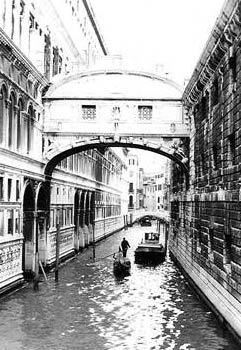
I travel far more tamely these days than I used to, but I still enjoy the ways to and from places far more than BEING THERE. Go figure that one. The climb up Mt. Olympus was so exquisite, the actual summit so boring, bare, colorless. A stone surface and a little stand with a sign-in book and a lackadaisical Greek flag. The wit of the day was someone else, a German who had earlier queried in this book, “Where are the gods?” I could think of nothing to top that but did wonder to myself how they would ever have chosen this place, but of course they can create paradise of any wilderness and may have been inhabiting that same plain on a different dimension, laughing at our bewilderment. I never rule out that scientific likelihood, especially in the context of discussions of how limited our five senses really are. As much as we see, how little it must be compared to the ultimate realities, whatever they are. In my earlier adulthood (my college years), I also greatly preferred the ways en route anywhere, but then, because my destiny was such a huge question mark, a behemoth burden, that I was always greatly relieved at the chance to hand over, at least for a few hours, that wretched weight to someone else. In airplanes I was particularly helpless and therefore least responsible for my fate - what a relief, even for a nervous flier. Later, in my wanderings around Greece, for instance, the question evolved more abstractly into contrasted stillness and motion, with motion the greatly preferred alternative. Perhaps beneath the road to the museum I knew the earth held so much more than whatever we’ve already discovered; perhaps I preferred the outdoors to the silence of the glass cases and polished floors; perhaps my imagination was more fired by nature than culture…who knows? As much as I wanted to be anywhere, getting there was always a letdown and I myself was let down at my own disappointed arrivals always. Why couldn’t I be happier to arrive?
There were exceptions, though. I could not stare at the Parthenon long enough, even on blazing summer afternoons that turned the back of my neck so dark I must have ascended to another ethnic group: the
Ethiopians or the gods. I felt transported into cinematics: the building, my favorite in the world, swayed
enticingly before me in the heat of the air. It became a large grin. The columns were noticeably curved yet
defiantly straight à la fois: one of the first optical illusions we know of. They created the illusion of straightness this way and besides that, a structurally far sounder edifice; ask an architect for the science behind this (which to my knowledge they haven’t been able to duplicate). All I know is the fascination it held out to me. I also loved the palace of Minos in Knossos almost as much, for all the colors, so completely defying our concrete stereotypes, for the labyrinth that actually still stands, though reason defies the probability of the myths we associate with the enigmatic place. It did happen, I told the smirking clouds. And more than that, something happened that has fired and swayed and captivated some very vital foundations of thought itself: I stand on the grounds where all this occurred, trying to let it happen again, through me, to give
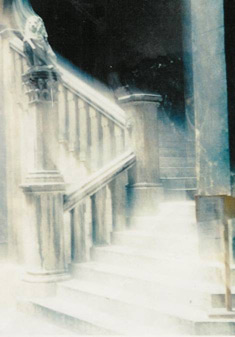
rebirth to it and revive, à la fois, our suffering, parched, vestigial civilization.
The wealthier classes early on added the dimension of the genteel tour to our concept of travel: the accoutrements of trunks laden with elegant excess and overkill, the lavish balconied hotels, horse-drawn coaches, languid boat rides, ruins virtually untouched, remnants enticingly strewn about for the taking, reams of journal pages scrawled in studied calligraphy and grammatical exactitude that would make even educated people these days wistful and more attentive not only to their content but how they express it, the luxury of months on end en voyage rather than the rationed days and hours of the disciplined middle-class work schedule, with holidays carefully trimming either end of the furlough if possible: oh, they could journey, they could think, they could breathe, they could experience, not just glance, rush, and desperately attempt to stretch out the experience with the various late-twentieth-century portables that burden us: Camcorders, digital cameras, automatics, pocket recorders, laptop computers, $99 sets of matched luggage on wheels courtesy of Sears or Penneys and packaged tours courtesy of the Greeks in New York City with all their
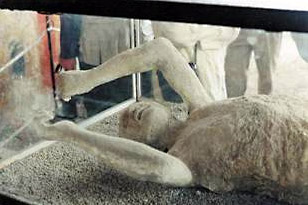
hometown contacts. We can glimpse their luxury and envy it, especially wish that all the sites worth seeing weren’t so traveled by everyone else so we could get a better idea of what they really looked like in antiquity.
But beyond all this wishful thinking, even beyond all the discoveries and intellectual dynamism, something all travelers throughout time do share that transcends our disparate economies is the circularity that touring implies: Odysseus’s voyage was sometimes referred mythically to the rising and setting of the sun, as in the circular daily voyage of Helios throughout the sky from dawn to dusk, with the theft of Helios’s cattle in Odyssey Book 12 assuming heightened significance as a result. There is circularity in Odysseus’s being blown back to Aeolus’s island after arrival within sight of Ithaca, close to the beginning of his journey from Troy and hence, angering the Wind God, being actually propelled onto another 10 years of wandering1 (what exasperation - I always wondered if Homer threw that in to see if his audience was nodding, bellies full of wine and cheer). But the real circle, of course, transcends this epicycle: the twenty years that encompass Odysseus’s departure from and homecoming to Ithaca. For this reason, the gentleman’s tour of the seventeenth-eighteenth centuries and beyond encompasses in its root meaning the essence of travel Heureux qui comme Ulysse a fait un beau voyage et puis est retourné: the best part of any trip is the homecoming, not just to all that is near and familiar but the perspectives home provides on everything that transpired en
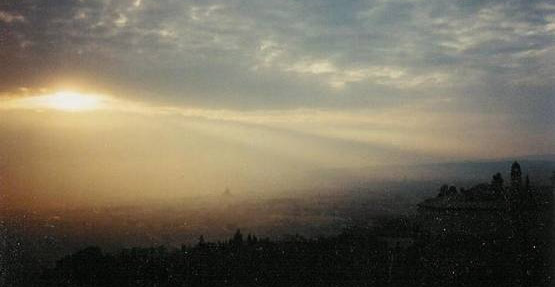
voyage. There’s no place like home, but you must keep leaving it to verify this insight, and never stop returning home, each return wiser than the last.
1. There are many versions of the actual geography of Odysseus’s voyage; some tried to reconstruct his ten-year adventures as a circular geometric pattern, a thesis most recent scholarship has dismissed.
copyright© Marta Steele 2001. All rights reserved.

